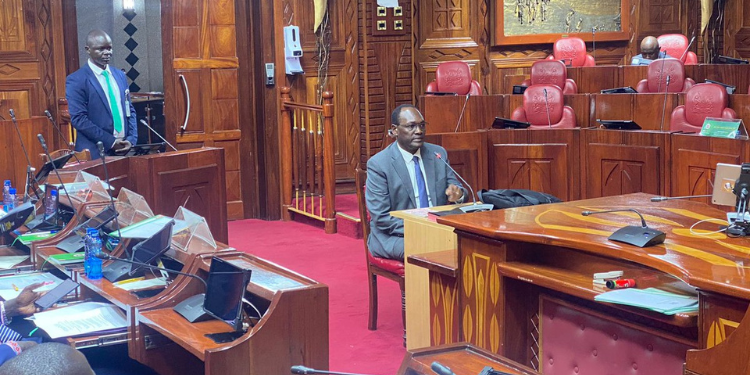A latest audit by Kenya’s Auditor General, Nancy Gathungu, has revealed that Ksh44.8 billion collected by means of the eCitizen digital funds platform through the 2023/2024 monetary 12 months is unaccounted for.
According to the report for the 12 months ended 30 June, 2024, a complete of Ksh 100,842,646,586, inclusive of an quantity of Ksh 44,816,483,773 in respect of income receivers, was collected by means of the e-Citizen Government Digital Payments (GDP) platform.
However, a overview of the e-Citizen portal and the income statements revealed variances between balances mirrored within the income statements, the e-portal system and the ledger, casting doubt on the completeness and accuracy of receipts reported by the receivers of income amounting to Ksh44,816,483,773.
The funds had been allegedly diverted by means of opaque transactions, unauthorised accounts, and insufficient oversight.
Table of Contents
Detailed Report on the eCitizen queries
Discrepancies in Revenue Reporting
The audit by Auditor General Nancy Gathungu for the 12 months ended June 30, 2024, additionally revealed that at least Ksh144 million was discovered lacking throughout varied MDAs, such because the Ministry of Lands, Business Registration Services, and NTSA, pointing to overstatements, incomplete, duplicate or partial funds that had been unexplained.
“Different MDAs had totally different processes, reporting codecs, and requirements,” the Auditor-General famous.
Lack of Documentation and Accountability
In addition, the Auditor-General’s report revealed that many authorities ministries, departments, and businesses (MDAs) that collected income through eCitizen:
- Did not preserve correct information of the providers rendered.
- Could not reconcile income collected with precise transactions or customers served.
- Submitted unaudited or conflicting figures to the National Treasury, making oversight just about inconceivable.
Cash books and financial institution reconciliation statements for a financial institution stability of Ksh7,101,673,055, held throughout twelve Kenya shilling and 9 US greenback denominated accounts, had been additionally not supplied for audit.
This, the Auditor General revealed, allowed MDAs to spend or divert public income with out parliamentary approval or audits.
What’s extra, balances from earlier years amounting to Ksh145,824,907 lacked supporting documentation, comparable to particulars of financial institution accounts or explanations for delays in fund transfers.
Also flagged within the report had been contracts signed by junior employees with out approval from key authorized and monetary establishments such because the Attorney-General and Treasury.
The absence of structured reporting created a vacuum in accountability, which was simply exploited by each public officers and personal contractors.
The lack of real-time monitoring instruments gave ministries the leeway to delay or suppress remittance of funds.
Auditor-General Nancy Gathungu additionally famous an absence of enforceable penalties for non-compliance or delayed reporting.
Control Weaknesses and Vendor Reliance
According to the Audit, the National Treasury reliance on a vendor for essential operations of the eCitizen platform resulted within the authorities missing full management over the system.
The platform is operated by a personal consortium, ECS, reportedly comprising Webmasters Kenya, Pesaflow, and Olive Tree Media.
As per the report, no signed service stage agreements (SLAs) existed with cost service suppliers, compromising oversight and accountability.
Ministries and businesses additionally reportedly used inconsistent templates, usually manually compiling monetary statements
Additionally, the settlement with Safaricom PLC for co-location and help providers had lapsed on June 30, 2023, additional weakening the governance framework.
Operational and Management Issues
Nancy Gathungu additionally took situation with how Ministries, Departments, and Agencies (MDAs) onboarded themselves independently, usually with out clear approval or alignment with Treasury techniques.
The Ministry of ICT, for example, lacked a structured coordination framework to control digital providers underneath one umbrella.
“Different MDAs had totally different processes, reporting codecs, and requirements,” the Auditor-General famous.
MDAs retained income as a substitute of remitting to the Consolidated Fund, violating Article 206 of the Constitution.
Some had no finance officers with the technical capability to interpret and report digital transactions.
Treasury, in response to the report, acquired delayed, incomplete, or manually compiled knowledge, impairing nationwide reporting.
Parliament takes motion
Two committees, Security and National Administration and ICT, have initiated investigations into the eCitizen contract.
MPs are questioning the legality and transparency of the contract signed on May 25, 2023, which provides non-public distributors the proper to dismantle the system if the settlement is terminated.
The contract permits distributors (Webmasters Kenya Ltd, Pesa Flow Ltd, Olive Tree Media Ltd) to withdraw all proprietary infrastructure, together with software program and technical techniques, upon termination.
It additionally exempts the distributors from legal responsibility, inserting the burden on the federal government to insure them in opposition to claims, knowledge loss, and repair outages.
The committees plan to summon Treasury PS Chris Kiptoo and different officers to clarify the contract phrases and the lacking funds.













